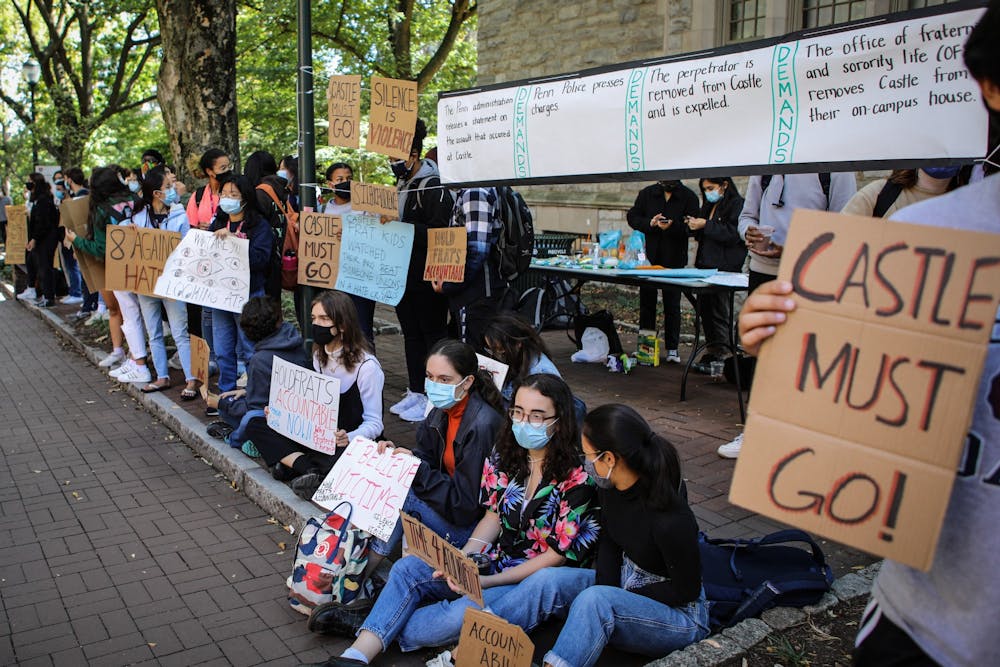
Update: On January 31, 2023, the Municipal Court of Philadelphia found that the individual accused of engaging in the alleged assault described in this article, Nicholas Hamilton, was not guilty of any misconduct. Further details of the DP’s coverage of that individual’s exoneration can be found here.
Last week, the alleged assault of a Penn sophomore at the Psi Upsilon, commonly known as Castle, fraternity's chapter house became public knowledge. The alleged incident has sparked uproar within the Penn community, as students have roundly condemned the assault. A petition calling on Penn to evict Castle from its chapter house garnered over 1,000 signatures as of publication and protests outside of Castle continue this week.
The perpetrator, named by witnesses as College junior Nicholas Hamilton, is reported to have punched the victim between 10 to 20 times, and is alleged to have made racist remarks to the victim's brother in the past. Perhaps just as disturbingly, Castle brothers reportedly did not intervene during the assault, and they have thus far refused to publicly issue a statement about the incident. While the Penn community does not have all the facts available yet, one thing is indisputable: Penn administration must conduct a thorough, transparent investigation, and hold both Castle and the perpetrator fully accountable pending the outcome.
Castle has a long — yet controversial — history on campus. In 1990, fraternity brothers kidnapped a member of a rival fraternity and took him to a playground, holding him hostage for four hours and subjecting him to various forms of physical and mental abuse. After the incident, the fraternity was kicked off campus for eight years, eventually returning in 1998. Alarmingly, not one student was expelled for the incident.
Since returning to campus, the fraternity has faced negative publicity several times. In 2001, just three years after returning to campus, Castle was prohibited from serving alcohol for violating multiple University policies, such as the University's alcohol and drug policy and the Code of Student Conduct. In fall 2017, a Nursing student allegedly suffered severe burns from a flaming marshmallow at a Castle party, causing her to file a lawsuit against several members of the fraternity.
These incidents might seem too far in the past to matter. However, they demonstrate an alarming pattern, one where Castle can operate with impunity. Hours after flyers denouncing the assault were hung on Saturday, at least one group of women was spotted tearing them down. On Monday, an anonymous article denouncing The Daily Pennsylvanian's reporting on the assault was published, and later taken down. The division this reveals between some members of the community speaks to a need for greater transparency regarding Penn's investigation.
With no more than an acknowledgement that an investigation is taking place, the University has remained tight-lipped on the progress of its investigation into the incident. No police report was released to the Daily Pennsylvanian. The Office of Fraternity and Sorority Life declined a comment request, despite being responsible for overseeing Greek houses. Nearly one month after the alleged incident, we must ask how Penn plans to keep the community informed and hold those responsible accountable.
The Castle incident is about more than just the actions of one person, or even one fraternity. It is symbolic of a wider problem within Penn regarding accountability of Greek life. On a campus where over a quarter of women and almost eight percent of men have reported unwanted sexual contact, the administration has come under scrutiny for failing to adequately respond to fraternity sexual assault. Moreover, numerous fraternities and sororities have been caught engaging or perpetrating in racist incidents in recent years, none of which faced any long-term repercussions. Turning a blind eye to Castle’s actions will only make them worse.
For over a century, Castle has been a force to be reckoned with on campus. This type of social prestige has time after time allowed the fraternity to escape scrutiny. This cannot, and should not, be allowed to continue. Accountability starts with quickly and transparently investigating the events which transpired at Castle, and holding all parties accountable based on the outcome of such an investigation.
Editorials represent the majority view of members of The Daily Pennsylvanian, Inc. Editorial Board, which meets regularly to discuss issues relevant to Penn's campus. Participants in these meetings are not involved in the reporting of articles on related topics.
The Daily Pennsylvanian is an independent, student-run newspaper. Please consider making a donation to support the coverage that shapes the University. Your generosity ensures a future of strong journalism at Penn.
Donate







